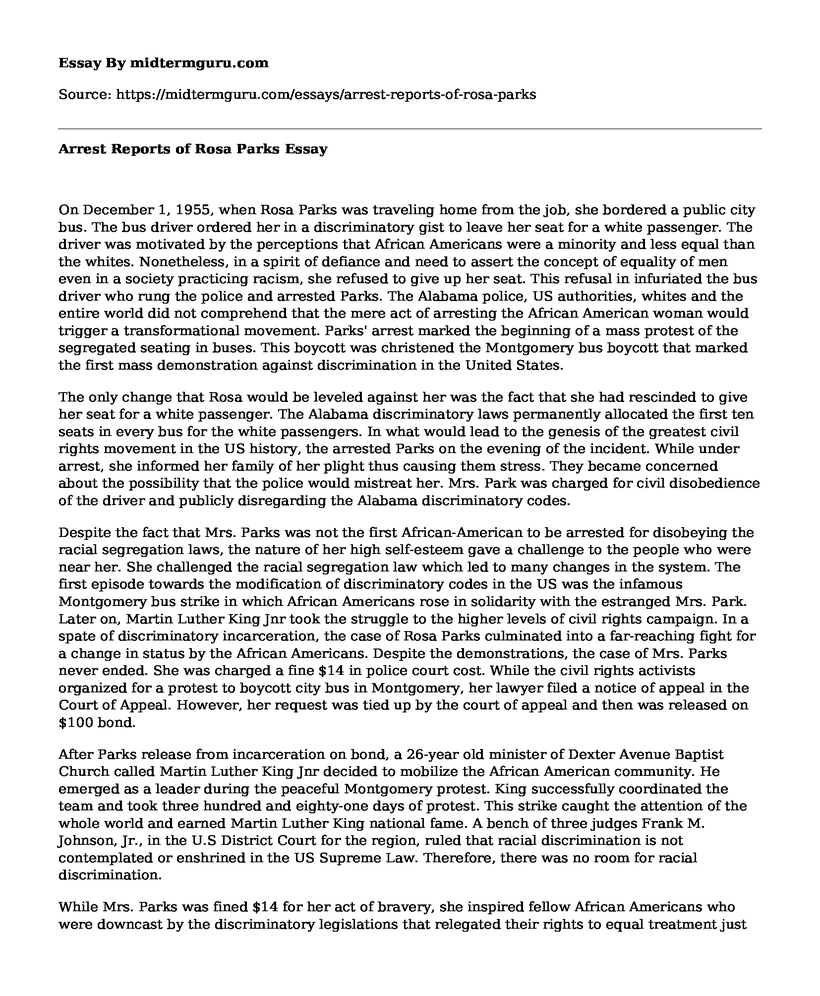On December 1, 1955, when Rosa Parks was traveling home from the job, she bordered a public city bus. The bus driver ordered her in a discriminatory gist to leave her seat for a white passenger. The driver was motivated by the perceptions that African Americans were a minority and less equal than the whites. Nonetheless, in a spirit of defiance and need to assert the concept of equality of men even in a society practicing racism, she refused to give up her seat. This refusal in infuriated the bus driver who rung the police and arrested Parks. The Alabama police, US authorities, whites and the entire world did not comprehend that the mere act of arresting the African American woman would trigger a transformational movement. Parks' arrest marked the beginning of a mass protest of the segregated seating in buses. This boycott was christened the Montgomery bus boycott that marked the first mass demonstration against discrimination in the United States.
The only change that Rosa would be leveled against her was the fact that she had rescinded to give her seat for a white passenger. The Alabama discriminatory laws permanently allocated the first ten seats in every bus for the white passengers. In what would lead to the genesis of the greatest civil rights movement in the US history, the arrested Parks on the evening of the incident. While under arrest, she informed her family of her plight thus causing them stress. They became concerned about the possibility that the police would mistreat her. Mrs. Park was charged for civil disobedience of the driver and publicly disregarding the Alabama discriminatory codes.
Despite the fact that Mrs. Parks was not the first African-American to be arrested for disobeying the racial segregation laws, the nature of her high self-esteem gave a challenge to the people who were near her. She challenged the racial segregation law which led to many changes in the system. The first episode towards the modification of discriminatory codes in the US was the infamous Montgomery bus strike in which African Americans rose in solidarity with the estranged Mrs. Park. Later on, Martin Luther King Jnr took the struggle to the higher levels of civil rights campaign. In a spate of discriminatory incarceration, the case of Rosa Parks culminated into a far-reaching fight for a change in status by the African Americans. Despite the demonstrations, the case of Mrs. Parks never ended. She was charged a fine $14 in police court cost. While the civil rights activists organized for a protest to boycott city bus in Montgomery, her lawyer filed a notice of appeal in the Court of Appeal. However, her request was tied up by the court of appeal and then was released on $100 bond.
After Parks release from incarceration on bond, a 26-year old minister of Dexter Avenue Baptist Church called Martin Luther King Jnr decided to mobilize the African American community. He emerged as a leader during the peaceful Montgomery protest. King successfully coordinated the team and took three hundred and eighty-one days of protest. This strike caught the attention of the whole world and earned Martin Luther King national fame. A bench of three judges Frank M. Johnson, Jr., in the U.S District Court for the region, ruled that racial discrimination is not contemplated or enshrined in the US Supreme Law. Therefore, there was no room for racial discrimination.
While Mrs. Parks was fined $14 for her act of bravery, she inspired fellow African Americans who were downcast by the discriminatory legislations that relegated their rights to equal treatment just like the whites. The Montgomery strike grew, and an estimated five thousand black people held a meeting and approved of the bus boycott. The protester's spokesman stated that boycott would go on until the drivers who drove the buses could no longer provide their services. This resolution became a significant threat to the US government. The blacks who did not find other means of transport could stay home as a sign of peaceful protest. From the manager's research, 90% of the black people who used the public city bus as a means of transport had gone for a boycott, and it became a loss to the government.
The black demonstrators offered the government agencies a possible way to avoid the consequences of their economic sabotage by allowing them a collective agreement in developing a program that would help in meeting every citizens rights. Following these protests, the United States also ruled out that racial segregation should be ended and civil rights of every citizens rights. Despite the rules that were enforced by the Supreme Court Mrs. Parks was still charged for violating a city law that gives bus drivers and police powers to enforce racial segregation. After Mrs. Parks conviction, she gained a title of Mother of the Civil Rights Movement. Her arrest led to the banning of racial discrimination. From a critical perspective, the step that Rosa Parks took to leverage the misfortunes that befell African Americans in her time made her the first black woman to fight for the civil rights.
Cite this page
Arrest Reports of Rosa Parks. (2021, May 26). Retrieved from https://midtermguru.com/essays/arrest-reports-of-rosa-parks
If you are the original author of this essay and no longer wish to have it published on the midtermguru.com website, please click below to request its removal:
- Essay on the United States History
- History Essay Sample: Indians Wars
- The Mysteries of the Egyptian Art, Pyramids and Architecture - Essay Sample
- Essay Sample on US Invasion of Iraq in 2003
- Article Analysis Essay on "Jefferson and Slavery" and "Jefferson and the Character Issue"
- Movie Analysis Essay on the Birth of a Nation
- Learning US History: From Gilded Age to Present Day - Essay Sample







